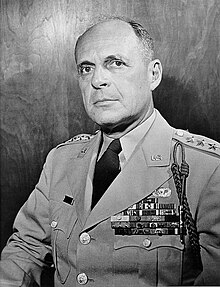
Back Matthew Ridgway Afrikaans ماثيو ريدجواي Arabic ماثيو ريدجواى ARZ ماتیو ریدقوای AZB Matthew B. Ridgway German Matthew Ridgway Spanish Matthew Ridgway Basque متیو ریجوی Persian Matthew Ridgway French מת'יו רידג'וויי HE
General Matthew Bunker Ridgway (3 March 1895 – 26 July 1993) was a senior officer in the United States Army, who served as Supreme Allied Commander Europe (1952–1953) and the 19th Chief of Staff of the United States Army (1953–1955). Although he saw no combat service in World War I, he was intensively involved in World War II, where he was the first Commanding General (CG) of the 82nd Airborne Division, leading it in action in Sicily, Italy and Normandy, before taking command of the newly formed XVIII Airborne Corps in August 1944. He held the latter post until the end of the war in mid-1945, commanding the corps in the Battle of the Bulge, Operation Varsity and the Western Allied invasion of Germany.
Ridgway held several major commands after World War II and is most well-known for resurrecting the United Nations (UN) war effort during the Korean War. Several historians have credited Ridgway for turning the war around in favor of the UN side. He also persuaded President Dwight D. Eisenhower to refrain from direct military intervention in the First Indochina War to support French colonial forces, thereby essentially delaying the United States' Vietnam War by over a decade.[citation needed] He received the Presidential Medal of Freedom on 12 May 1986.[4] Ridgway died in 1993 at the age of 98.
- ^ Dunlop, Richard (23 January 2018). "A Story Of The Airborne And Ridgway". Chicago Tribune.
- ^ "Ridgway, Matthew Bunker, 'Old Iron Tits'". World War II Graves. 23 January 2018.
- ^ "GEN Matthew Bunker Ridgway, 'Old Iron Tits'". Military Hall of Honor. 1 January 2021.
- ^ Arthur, Billy A., Obituary: General Matthew Ridgway, The Independent, 1993-08-10, retrieved 2009-08-31
